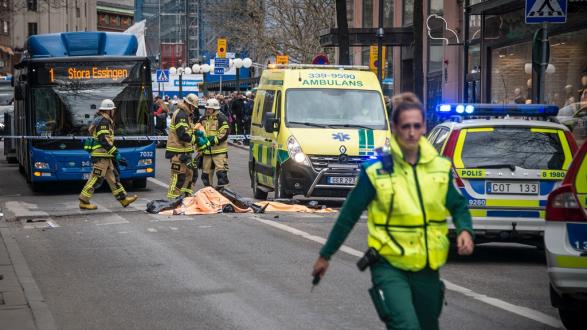In:
Global Beat is your weekly stop for news from around the world. Join us every Friday morning for important stories you should know about.
This week, the terror attack in New York draws attention to the spread of ISIL and the growth of religious extremism in central Asia; New Zealand announces visa proposal for climate refugees; South Korea and China resume normal relations after yearlong THAAD tension; and more.
____________________
Americas
U.S. Special Counsel Robert Mueller announced charges against three of President Trump’s former campaign aides on Monday in the latest development in the probe into whether the Trump campaign coordinated with Russia to influence the 2016 presidential election. Former Trump campaign manager Paul Manafort and his aide Rick Gates were indicted on 12 counts, including money laundering, making false statements, tax evasion, and conspiracy against the United States, and pleaded not guilty on all charges. George Papadopoulous, former foreign policy advisor to the Trump campaign, pleaded guilty to making false statements to FBI agents and is cooperating with the investigation.
Also check out:
Central & South Asia
Tuesday’s terror attack in Manhattan, which killed eight people and injured 11, is drawing attention to the spread of ISIL and the growth of religious extremism in central Asia. The main suspect, Sayfullo Saipov, is from Uzbekistan, a predominantly Muslim, former Soviet republic. Uzbekistan is not listed in President Trump’s latest travel ban, though Uzbek nationals were responsible for multiple terror attacks in Europe this year, including a truck hijacking in Stockholm, a shooting spree in Istanbul, and a subway explosion in St. Petersburg. A source was quoted as saying that Saipov started studying religion after emigrating from Uzbekistan and "couldn’t get enough" of the religious freedom in the United States, a drastic change from his home country, where an authoritarian government has targeted the Muslim population.
Also check out:
China & East Asia
South Korea and China announced Tuesday that they would resume normal relations following a yearlong standoff over Seoul’s installation of the U.S.-owned Terminal High Altitude Area Defense (THAAD) missile system. Beijing saw THAAD as the United States’ latest attempt to undercut its national security and encroach on its territory, and had insisted that it be removed. In response to Seoul’s refusal, China instituted a boycott of South Korean consumer goods which knocked South Korea’s GDP down 0.4 percentage points this year. The announcement comes in anticipation of the Asia-Pacific Economic Cooperation Summit next week.
Also check out:
- Japan parliament re-elects Shinzō Abe as prime minister – Deutsche Welle
Europe & Russia
Andrej Babiš, billionaire leader of the Czech ANO party, has been tasked with building a minority government after winning an endorsement from President Milos Zeman and 78 out of 200 seats in the October 20-21 parliamentary elections. Babiš has three weeks to negotiate a coalition with eight other parties, who so far have refused to work with him over concern about fraud allegations. A new house speaker must be elected before Babiš can be appointed prime minister, a process that could be manipulated to stall Babiš’s transition to government and might result in a gridlocked parliament and a provisional budget.
Also check out:
Middle East & North Africa
Representatives from Iran, Russia, and Turkey met this week in Astana, Khazahkstan, for the 7th round of talks on the war in Syria. Kazakh Foreign Minister Khairat Abdul Rahman read the final communique issued by the group, which stressed the need for a peaceful resolution to the conflict and the importance of countering terrorism in the de-escalation zones controlled by Iran, Russia, and Turkey. Further talks are scheduled in Sochi and Geneva later this month, though the Syrian opposition’s announcement that it will forego Moscow’s "congress of Syrian national dialogue," as well as Turkey’s opposition to the Syrian Kurds’ invitation, have complicated the process.
Also check out:
Southeast Asia & Oceania
The New Zealand government has announced a proposal to create a new visa category allowing people displaced by climate change to register as refugees. Green Party leader and climate change minister James Shaw said that "an experimental humanitarian visa category" could be implemented to allow people from the Pacific who are displaced by climate change to seek asylum in the country. New Zealand currently accepts about 750 refugees a year. A new visa category for climate refugees would permit entrance to 100 more annually and could serve as a model for Europe if successful. In an interview with CNN Tuesday, Prime Minister Jacinda Ardern argued that New Zealand has a "duty of care" to respond to the humanitarian challenges posed by climate change.
Also check out:
- Manus Island refugees, ordered to leave camp, fear for their safety – The New York Times
Sub-Saharan Africa
South Sudan President Salva Kiir Mayardit met with his Sudanese counterpart Omar al-Bashir in Khartoum Wednesday to discuss the war in South Sudan, border disputes, and joint security issues. South Sudan gained independence from Sudan in 2011 and has since been embroiled in war, in what constitutes the longest-conflict in African history. Border skirmishes and accusations that either side was supporting rebel movements had previously stymied productive dialogue between the two nations.
Also check out:




